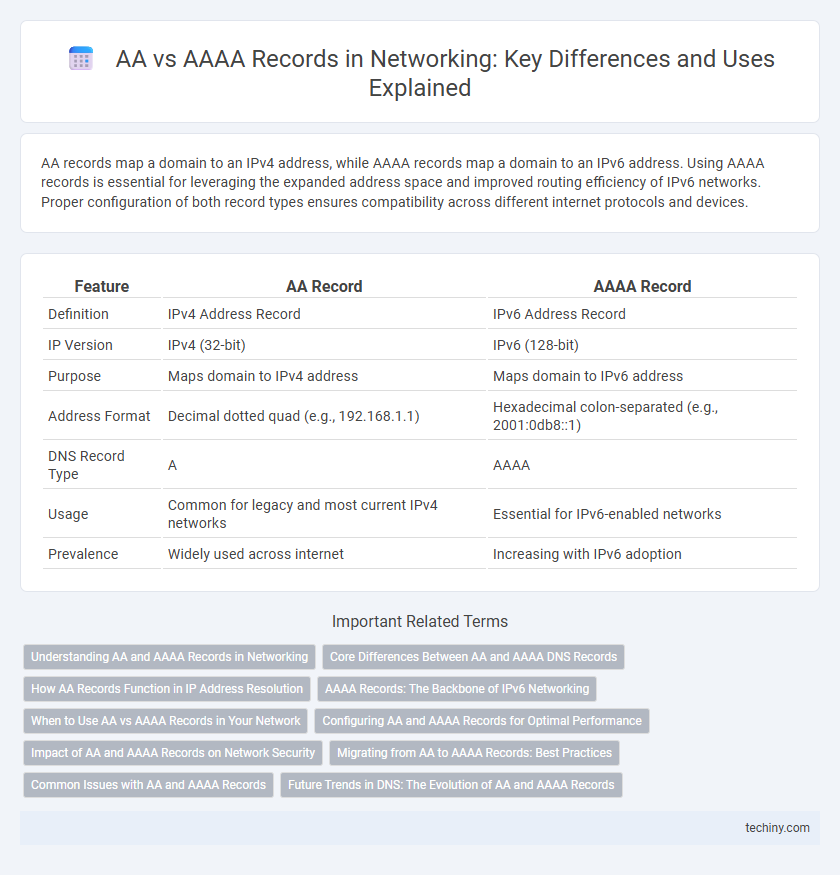AA records map a domain to an IPv4 address, while AAAA records map a domain to an IPv6 address. Using AAAA records is essential for leveraging the expanded address space and improved routing efficiency of IPv6 networks. Proper configuration of both record types ensures compatibility across different internet protocols and devices.
Table of Comparison
| Feature | AA Record | AAAA Record |
|---|---|---|
| Definition | IPv4 Address Record | IPv6 Address Record |
| IP Version | IPv4 (32-bit) | IPv6 (128-bit) |
| Purpose | Maps domain to IPv4 address | Maps domain to IPv6 address |
| Address Format | Decimal dotted quad (e.g., 192.168.1.1) | Hexadecimal colon-separated (e.g., 2001:0db8::1) |
| DNS Record Type | A | AAAA |
| Usage | Common for legacy and most current IPv4 networks | Essential for IPv6-enabled networks |
| Prevalence | Widely used across internet | Increasing with IPv6 adoption |
Understanding AA and AAAA Records in Networking
AA (Authoritative Answer) and AAAA (IPv6 address) records serve distinct purposes in DNS. AA records indicate that a DNS response is authoritative, confirming the data originates from the primary source. AAAA records map domain names to IPv6 addresses, enabling devices to locate hosts on IPv6 networks efficiently.
Core Differences Between AA and AAAA DNS Records
AA records do not exist; the correct terms are A and AAAA records, which serve distinct purposes in DNS. A records map domain names to IPv4 addresses using a 32-bit format, while AAAA records map domains to IPv6 addresses with a 128-bit format, supporting the expanded addressing needs of modern networks. The core difference lies in address compatibility, where A records facilitate legacy IPv4 connections and AAAA records enable connectivity in IPv6 environments, ensuring seamless internet communication.
How AA Records Function in IP Address Resolution
AA records, often confused with A records, are not standard DNS record types; the correct term is A records, which map a domain name to an IPv4 address. In IP address resolution, A records function by associating a hostname with a 32-bit IPv4 address, enabling clients to locate servers on the internet. For resolving IPv6 addresses, AAAA records are used, linking domain names to 128-bit IPv6 addresses.
AAAA Records: The Backbone of IPv6 Networking
AAAA records serve as the backbone of IPv6 networking by mapping domain names to 128-bit IPv6 addresses, enabling seamless connectivity in modern internet infrastructures. They play a critical role in supporting the vast address space of IPv6, facilitating efficient routing and improved network performance compared to traditional IPv4 A records. With the global transition to IPv6, AAAA records are essential for future-proofing DNS systems and ensuring compatibility with emerging internet protocols.
When to Use AA vs AAAA Records in Your Network
AA records map domain names to IPv4 addresses, making them essential for networks primarily relying on IPv4 infrastructure. AAAA records correspond to IPv6 addresses, supporting modern networks designed to handle IPv6 traffic and future-proofing connectivity. Use AA records for compatibility with older systems and AAAA records to leverage the expanded address space of IPv6, ensuring efficient routing and improved network scalability.
Configuring AA and AAAA Records for Optimal Performance
Configuring AA (Address) and AAAA (IPv6 Address) DNS records correctly is essential for optimal network performance and compatibility. Use AA records to map domain names to IPv4 addresses, ensuring legacy system support, while AAAA records link domain names to IPv6 addresses for enhanced scalability and future-proofing. Properly balancing and maintaining both records improves resolution speed, reduces latency, and ensures seamless access across diverse network environments.
Impact of AA and AAAA Records on Network Security
AA (IPv4) and AAAA (IPv6) DNS records play a critical role in network security by defining the IP addresses associated with domain names, directly influencing traffic routing and access control. Proper configuration of AA and AAAA records prevents DNS spoofing and man-in-the-middle attacks by ensuring accurate resolution of domain names to legitimate IP addresses, thus safeguarding data integrity and confidentiality. Misconfigured or maliciously altered AA and AAAA records can expose networks to cyber threats, making regular auditing and DNSSEC implementation essential for robust network security.
Migrating from AA to AAAA Records: Best Practices
Migrating from A to AAAA records requires thorough DNS auditing to identify all IPv4 addresses before transitioning to IPv6. Ensure simultaneous support for both record types during the migration to maintain service availability and prevent downtime. Update internal documentation and monitor network performance closely to detect and resolve any connectivity issues promptly.
Common Issues with AA and AAAA Records
Common issues with AA and AAAA records often involve misconfigurations such as incorrect IP address entries or outdated DNS caching, leading to connectivity problems. IPv6 AAAA records may be improperly prioritized over IPv4 AA records, causing compatibility issues with devices lacking full IPv6 support. Ensuring accurate DNS record updates and proper TTL settings helps mitigate resolution failures and improve network reliability.
Future Trends in DNS: The Evolution of AA and AAAA Records
The evolution of AA and AAAA records reflects the ongoing transition from IPv4 to IPv6, with AAAA records becoming increasingly critical for future-proof DNS infrastructure. Enhanced support for IPv6 addresses in AAAA records offers improved scalability, security, and flexibility in modern networking environments. Emerging DNS technologies and protocols will further optimize address resolution, ensuring seamless integration of both record types in advancing internet architectures.
AA vs AAAA records Infographic

 techiny.com
techiny.com